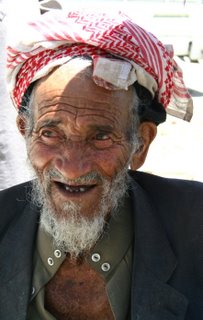 I'll be surprised if the ruling President Ali Abdullah Saleh ends up with anything less than 75% of the vote in the presidential election in Yemen.
I'll be surprised if the ruling President Ali Abdullah Saleh ends up with anything less than 75% of the vote in the presidential election in Yemen.
The government in Yemen controls TV and radio, and has done its best to intimidate the few independent journalists who try to report on the endemic corruption within the country. In previous elections voters have been under-age, or bussed in from other constituencies to vote the government back in. "We are not a democratic country", one opposition politician told me when I visited earlier this year, "We are trying to be." Still, if Saleh has won only 80%, that is a significant swing against him. But there is still a long, long way to go.
Yemen's most recent troubles started back in 1990. Yemenis used to work around the Middle East, but when Saleh backed Saddam Hussein's invasion of Kuwait that year Yemen was ostracised by other Arab countries and Yemenis were forced to return home. Unemployment has ballooned since, the population is growing unsustainably, and the country's oil is running out. And, as a walk around the capital, Sanaa, confirms, the famous statistic that, in Yemen, guns outnumber people by a ratio of 3:1 seems quite possible. Angry young men with lots of guns is a combustible mix.
Western governments are alive to the dangers of an unstable Yemen. And it is under pressure from these governments that President Saleh has promised to embark on the much-needed economic reforms that Yemen needs. But in this, the poorest of Arab countries, a tentative step in this direction last year - a cut in the petrol subsidy - sparked outrage and riots that led to many deaths. Most of the cut was rapidly reinstated. And his political party, the GPC, seems less convinced about the need for reform. I listened to the party's deputy general secretary complain that the opposition (who are massively outnumbered in a parliament which, in any case, has no real powers) were continually telling lies. "They always say that everything is black", he said. But if anything, 'black' is an understatement.
Thursday, September 21, 2006
No change in Yemen
Subscribe to:
Post Comments (Atom)



No comments:
Post a Comment